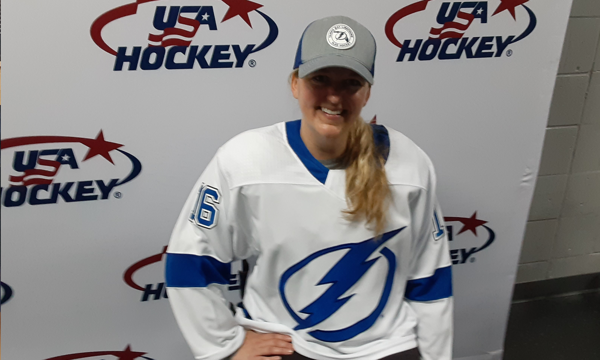WESLEY CHAPEL, Fla. – Monica Quimby’s drive and determination were on display during the Tampa Bay Lightning sled hockey team’s opening game Friday morning at the 13th annual USA Hockey Sled Classic, presented by the NHL.
While her team lost 5-4 to Pittsburgh, the 37-year-old Quimby’s desire to continue to plow ahead was evident, as the Lightning fought back from a four-goal deficit in the third period to make Pittsburgh sweat.
“I am a driven person,” she said following the game. “As soon as I was paralyzed, I knew I had to keep going. I had to keep getting up in the morning. Even though those mornings were hard, especially in the beginning after I was first paralyzed and learning how to get dressed again, to drive again and do basic activities, I thought that as long as I keep going and get one percent better every day, that I would be OK.”
Not only has she been OK, but Quimby, who lives in Lakewood Ranch, Florida, about 65 miles south of the Wesley Chapel, has thrived on and off the ice.
“When I first started playing sled hockey, I went from a leg–dominant sport to arm–dominant sport,” said Quimby, who began playing sled hockey in 2012. “I went from using my legs and core to using arms and core. If you know hockey and have hockey sense, you have one step in the right direction. You have to learn to maneuver the sled and be ambidextrous.”
Quimby adjusted quickly and made the U.S. Women’s Development Sled Hockey Team in 2014.
In the larger picture, getting on the ice and competing only helps give the sport more exposure, something with which Quimby is passionate about.
“I feel that the sport is growing not only nationally, [but] internationally,” she said. “The women’s team keeps getting more and more players. The more that we are out there and the more that we are introducing people to the sport, some are like, ‘Wow, that’s awesome. I ought to try that.’”
Quimby has accomplished quite a bit away from the rink as well. She began a teaching career at 23 years old and spent eight years as an adjunct professor at Southern Maine Community College. She taught biology, microbiology and anatomy and physiology.
“I was the youngest professor that had ever been at the community college,” Quimby said. “In the beginning I felt that I had to overcompensate. I used the motivation as a strength.”
Quimby currently works remotely as the coordinator of a leader’s programwith Illinois-based BACKBONES, an organization that helps individuals with spinal cord injuries.
“I help them find everything from employment to sports to community connections,” she said. “It is really fulfilling. I absolutely love it. I am not in the classroom anymore, but still teaching in a different way.”
In doing so, Quimby continues to set more examples of how to carry on after a serious accident. Carrying on is what she wants to continue to do with sled hockey as well, especially with the Lightning logo on her sweater.
Quimby praises former Lighting owner Phil Esposito, still a presence with the team as a radio color commentator and ambassador, for much of what has taken place with the sled team.
“He has had such an influence in developing the Lightning sled team,” she said. “Having this team is so incredible and it gives us all an outlet. It is an outlet to be active, to socialize and get out in the community. It is really awesome.”



